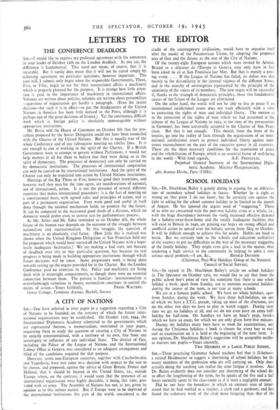A CITY OF NATIONS
SIR,—You have referred in your paper to a suggestion regarding a City of Nations to be founded, on the territory of which the future inter- national organisations may be established. On October 15th, 1944, the International Diplomatic Academy submitted to the governments which are represented thereon, a memorandum, mentioned in your paper, requesting them to study the question of creating a City of Nations to be entirely exterritorialised, with a territory of its own, free from any sovereignty or influence of any individual State. The district of Gex, including the Palace of the League of Nations and the International Labour Office at Geneva, was considered as an adequate arrangement and filled all the conditions required for that purpose.
However, seven non-European countries, together with Czechoslovakia and Yugoslavia, have just come to a decision with respect to the seat to be chosen, and proposed, against the advice of Great Britain, France and Holland, that it should be located in the United States, i.e., outside Europe where, on the contrary, it would seem that the presence of an international organisation were highly desirable, it being, this time, pro- vided with an army. The Assembly of Nations has not as yet, given its opinion as to this serious matter. But if Europe were to be deprived of the international institutions this part of the world, considered as the cradle of the contemporary civilisation, would have to organise itself after the model of the Panamerican Union, by adopting the proposed area of Gex and the Ariana as the seat of the City of Nations.
Of the twenty-eight European nations which were invited by Aristide Briand to a dejeuner de l'Europe in Geneva, nine only have in fact been asked to sit at San Francisco last May. But that is merely a pass- ing event. . . . If the League of Nations has failed, its defeat was due mainly to the dissimilarity in the internal regimes of the different States, and to the anarchy of sovereignties represented by the principle of the unanimity of the voices of its members. The new organ will be successful if, thanks to the triumph of democratic principles, these two fundamental causes of the failure of the League are eliminated.
On the other hand, the world will not be able to live in peace if an international juridictional resort does not work efficiently with a view to protecting the rights of man and individual liberty. The motion as to the protection of the rights of man which we had presented at the tribune of the League of Nations in 1933, at the time of the persecutions in Germany; has been universally accepted in the Charter of San Fran- cisco. But that is not enough. This should, from the letter of the treaties, go into the reality of facts through the organisation of an inter- national juridictional resort to protect individual liberty against mon- strous encroachment on the part of the executive power in all countries. These are the three necessary conditions for the restoration of peace and the rehabilitation of Europe, which is an essential factor of well-being
in the world.—With kind regards, A-F. FRANGULIS, Perpetual General Secretary of the International Diplo- matic Academy. Minister Plenipotentiary. 4b1s Avenue Hoche, Paris (VIlle).


























 Previous page
Previous page